Can Candles Explode? Yes! Here's How to Stay Safe
Author: Anne Cowart | Editor: Omar Alonso
Review & Research: Jen Worst & Chris Miller

Do you enjoy lighting some scented candles around the bathtub at night? It's a great way to set a relaxing and calming ambiance for your evening soak. But can candles explode? Chances are you never dreamed your candles present a fire and safety hazard to your health and home.
Before you light the wick tonight, you might want to consider that candles aren't as safe as you thought. There are plenty of horror stories on internet message boards about how candles burst into a fiery inferno, damaging property, and burning people.
Exploding candles are a very real consideration. This post examines why this happens and what you can do to protect yourself against becoming a victim.
Can Candles Explode? Exploding Candles Do Happen!
Yes, it's true. As astonishing as it sounds, candles can explode, causing burns and damaging property and people. Before you gather up all those Yankee candles in the bathroom and bedroom and throw them in the trash, you need to know that it's not a regular occurrence.
Chances are you'll never have to deal with this problem, but it helps to be prepared for it and understand what causes candles to act like mini-pipe bombs. If you follow proper handling best practices for your candles, you probably won't ever have to deal with the threat of a fiery inferno in your home.
Why Do Candles Explode & Start Fires?
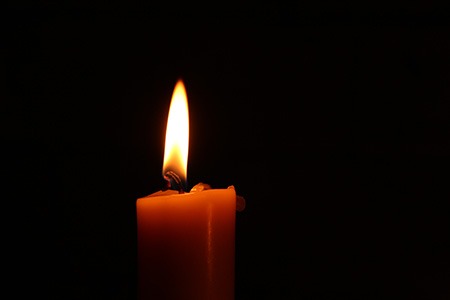
We’ve established that this can most definitely happen in most types of candles but especially those in containers. Candles can explode and though it’s even more rare, they can lead to a fire. Here’s why that happens.
Reactions Between Hot Candles and Water
Candle wax and water are a dangerous combination. If water lands on molten wax, it causes a heat differential resulting in a potential for an explosion. That's science in action, baby. The water landing on the wax initiates a chemical reaction involving the wax, water, and oxygen in the immediate area.
The vaporization of the water splatters molten wax, creating all the elements to initiate an explosion. The more water landing on the wax, the greater the chance for a bigger reaction and potential for an explosion. This is the leading cause of an exploding candle. Be careful with those candles around the bathtub.
Over-Burning Glass Jar Candles
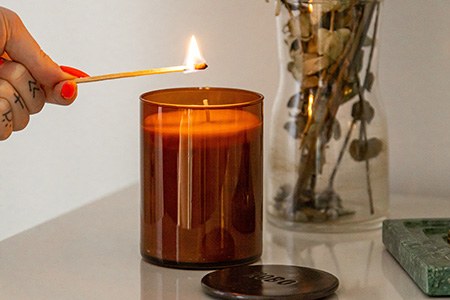
Many ornamental candles, like Yankee Candles, come in glass jars. This material is fine with handling heat and won't crack or break easily. When the candle burns, the center of the wax heats first, slowly spreading to the outer edges of the candle. You'll overheat the wax if you leave the candle burning for hours.
This results in the glass absorbing more heat through the conduction process, leading to the glass reaching the point where it cracks. Depending on the thickness of the glass, the cracking effect could result in a violent explosion, splattering hot wax, and shattered glass pieces in the immediate area surrounding the candle.
Accumulated Carbon Deposits on the Wick
If you burn the candle for more than four to five hours, the wick accumulates carbon deposits, resulting in soot falling into the molten wax. This action potentially clogs the wick, causing improper burning and an explosion.
The Candle Wax Reaches the Flash Point
Extended burning of your candle for longer than four to five hours may also cause the wax to reach its "flash point." The flash point is the temperature at which the wax catches fire. For candle wax, the flash point is between 392° to 464° Fahrenheit. Remember to extinguish the candle after it serves its purpose and before you leave the room. Can candles explode? Yes, and burning them for too long is a huge contributor.
How Do You Prevent Candles From Exploding & Starting Fires?
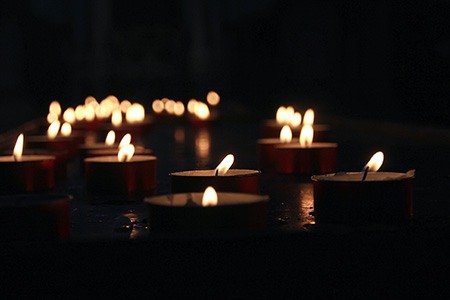
You don't want to be the person who's candle exploded and then you learn all about it. Obviously safety is of the utmost importance, not only for you and your family but for your home structure and the safety of your neighbors.
Let’s make sure none of that becomes a problem by avoiding exploding candles altogether. Don't be the person asking "why did my glass candle explode?" Avoid it altogether.
Keep Candles Away From Flammable Items
Position your candles strategically around your bathroom and bedroom. Please don't leave them anywhere near curtains or flammable materials, and ensure they are off the carpet and there's no chance splattering wax can jump from the candle to the carpet or rug, where it sets it on fire. Keep candles away from wood, paper, and bookshelves.
Don't Burn Candles Near Water Sources or Wet Surfaces
Don't burn your candles near water sources. If you have them around the bath, ensure the bathroom is well-ventilated and steam doesn't build up in the air. Please don't leave the candles on the bathtub's edge, where you might accidentally knock them into the water.
Don't Burn Your Candle for Too Long
Don't leave candles burning without being in the room. Put them out when you finish your bath and don't fall asleep in the bedroom with them burning. Don't go to bed and leave candles burning in the lounge. Stick to the rule of burning candles for no longer than four hours.
Avoid Placing Candles Around Air Vents & Drafts
Don't leave candles around air vents or in rooms in the home exposed to drafts. The wind could knock the candle over. If the candle does explode, the extra air moving through the area causes a bigger eruption and bigger fire, with the potential for the flames to spread faster through the room.
Never Place Candles in Broken Glass Jars
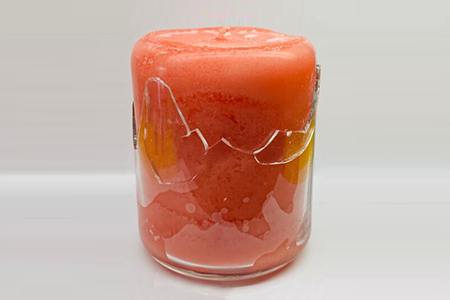
Don't burn a candle in a broken glass jar. If you accidentally drop your Yankee Candle, toss it out or melt the wax and transfer it to a new container, but don't burn it in the cracked one. You may have a future exploding candle on your hands.
The cracks weaken the structure, resulting in shards of glass flying everywhere if the candle explodes. The jar may also leak hot wax from the cracks, presenting a fire hazard. It can also end up having moisture inside the jar, especially if used in a humid bathroom. Please be careful.
Trim the Candle Wick
Trim an eighth of the wick for efficient burning, but don't trim it too short. This strategy prevents soot buildup and creates a better flame. Trim the wick after burning the candle for four to five hours. Leaving it too long (over an inch) causes soot buildup, increasing fire hazard risk.
Keep Candles Away from Pets & Children
Don't place candles in areas where the dog's tail might knock them over, or the cat could walk by them and knock them over. Keep them away from the reach of children. Young children might find the flame mesmerizing and reach out to it, potentially knocking it over and starting a fire. Or they might spill hot wax on themselves, burning their skin or eyes.
Place the Candle on a Stand
Use a candle stand to secure it in place. A candle stand will look like a coffee cup saucer, with a small handle around the rim to carry it around. You'll see a spike in the center of the holder to mount the candle. Press the candle onto the point and ensure the wax drips onto the plate surface, not over the sides.
Opt for Candle Alternatives
When you hear the answer to the question "can candles explode" you may decide you don't like the risk no matter what the chances are. There are plenty of candle alternatives, though each come with their own possible problems, too. You can consider options like electric candles that can produce fragrances, fresh flowers, oil and reed diffusers, wax warmers, incense, air freshener sprays, and my favorite, potpourri. Just don't leave the wax warmer on forever.
How Do You Extinguish a Candle Fire?
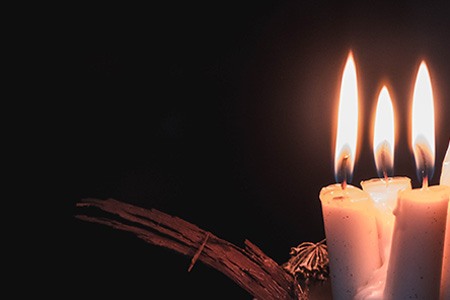
Sometimes, the worst scenario happens, and you find yourself dealing with a candle fire. Don't try to douse the fire with water. We already discussed how water and wax don't mix. Keep a small bucket of sand near the candle and use it to extinguish the fire.
If the fire spreads fast, and you don't have any immediate means of extinguishing it, evacuate the home immediately and call the fire department from the yard. If you're renting, the landlord will have fire insurance, and you'll get reimbursed for your loss. It's not worth trying to salvage your belongings at the risk of being consumed in a house fire.
What Do You Do with a Wet Candle?
So, what do you do if you have a wet candle or take it outdoors and accidentally expose it to light rain? The chances are it won't cause a candle explosion unless it's super-hot and in a glass jar.
If a cold, unlit candle gets wet, don't try to light it. Leave it to dry out properly in the sun, or throw it away. Whether you choose to dry or toss it in the trash depends on the type of candle in question. If you have a solid candle like a Yankee Candle, it might be fine to dry it and leave it for a few days to ensure all the water evaporates.
Yankee Candles and other scented candles are expensive, so throwing them out is a waste of money. It's better to try and salvage them if you can. However, if it's completely saturated, you might have to bite the bullet and toss it in the trash.
If you have an outdoor citronella candle that got wet overnight, it's not worth the risk of lighting it. Just throw it away and replace it. You'll have to use your best judgment to salvage or dispose of the candle.
Some expensive ornamental candles come with information labels about their contents and instructions for handling them if they get wet. Don't let your wallet cloud your judgment. If you think it's unsafe to salvage the candle, rather throw it out than risk lighting it.
Can Candles Explode? Yes, So Please Be Safe
Many people love using candles at home. The low light and fragrant scent of a Yankee Candle is a great way to enhance your evening soak in the tub or set a romantic ambiance for a date. Provided you follow the tips in this post, you shouldn't have any problems with your candles exploding.
Remember, fire is a dangerous element and deserves respect. Can candles explode? Yes, exploding candles are a thing. Keep your candles away from water, and don't burn them for too long. Follow the manufacturer's instructions, and you'll have a safe and satisfying candlelight experience.




